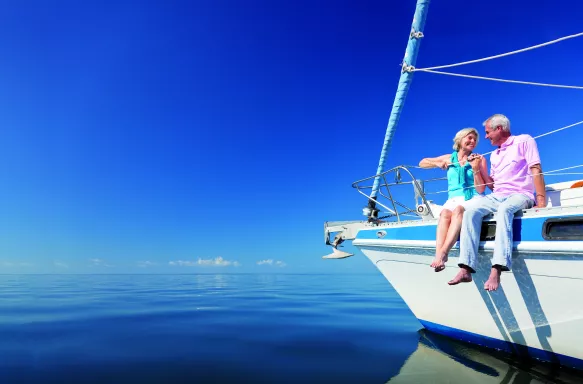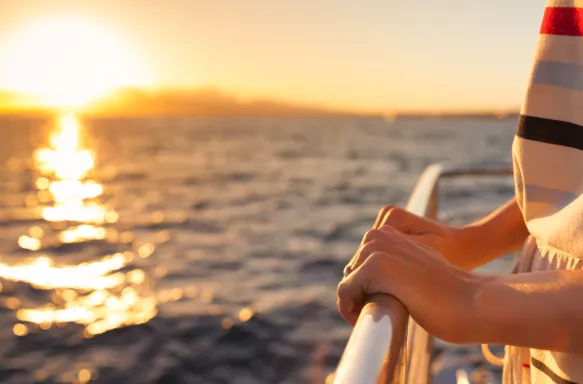12 Ways to Banish Seasickness

Understand why seasickness occurs and how best to prevent, recognise, and treat this minor condition.
An ocean cruise is a fantastic way to explore some of the world’s most incredible destinations while enjoying luxurious accommodation, world-class food, and absorbing entertainment while you travel. From marvelling at the majesty of Norway’s fjords or exploring America’s last frontier on an expedition cruise to Antarctica, to experiencing the palatial surroundings of a Southampton to New York cruise on the splendid Queen Mary 2, our ocean cruises offer adventure for all tastes.
Our ocean cruise collection offers an incredible variety of cruises – from cruising the Norwegian Fjords to exploring the Mediterranean aboard the magnificent Royal Clipper.
While ocean cruises are comfortable with attentive staff taking care of all your needs, some travellers may find ocean voyages cause a short-lived bout of seasickness.
What Is Seasickness?
It’s natural to worry about seasickness, especially if you’re new to ocean cruising. Seasickness is a common concern for if you’re considering an ocean cruise, but the good news is that most people aren’t highly susceptible to motion sickness. Today’s modern ocean cruise ships are designed to minimise the swell and roll of the ocean, with most passengers barely registering motion, allowing passengers to travel in comfort. And if you do suffer feelings of seasickness, the good news is that this rarely lasts more than a few days.
Who Is Prone To Seasickness?
Some people are more prone to seasickness. More common in children than in adults, seasickness typically peaks in your 20s with older people generally less affected. People who suffer migraines are typically more prone to motion sickness, and men are less likely to suffer from it.
Seasickness has been part of our seafaring heritage throughout the ages. Ancient Greek sailors suffered from seasickness, and the word ‘nausea’ is derived from ‘naus’, the Greek word for ‘ship’. Even famous sailors including Lord Nelson, Christopher Columbus and Charles Darwin reportedly suffered; Darwin is reputed to have made his observations on evolution after disembarking his ship The Beagle onto the Galapagos Islands due to seasickness.
What Causes Seasickness?
Seasickness occurs when your inner ear and central nervous system signals to the brain that your body is moving – caused by the swell of the sea – but your eyes can’t detect the movement. This mismatch confuses your brain, and in turn, you feel unwell.
Seasickness is a form of motion sickness – a feeling of unwellness brought on by certain kinds of movement. In the case of seasickness, it’s brought on by the motion of a ship. Travelling by car, train, and air along with theme park rides, virtual reality environments, and simulators can also induce motion sickness. If you don’t get motion sickness generally, you’re less likely to feel unwell on the ocean.
What Are The Symptoms Of Seasickness?
Seasickness on the open sea can last up to three days. Symptoms can start slowly and include pale skin, dizziness, drowsiness, dry mouth, headache and progress to nausea and vomiting.
12 Ways To Prevent And Cure Seasickness
1. Get Seasickness Medication From Your Doctor
Prevention is better than cure. If you suffer from motion sickness, such as when travelling by car, or think you may be susceptible to seasickness, consult your doctor before travelling. Your doctor can prescribe medications, including tablets such as Hyoscine or medications such as a Scopoderm patch that you apply to your skin while travelling.

2. Pack Over-The-Counter Medications
Your local chemist can give you advice on over-the-counter seasickness medications. Most are antihistamine-based medicines – similar to hayfever and allergy medications – and are designed to prevent seasickness.
3. Check Existing Medications
It’s worth reading the information included with any medication you currently take. Some medicines, such as painkillers and antidepressants, can worsen the effects of seasickness.
4. Choosing Your Cabin
If you’re worried about seasickness, opt for a cabin near the middle of the ship and near the waterline. While ocean cruise ships are large and stable, any motion you may detect is lessened towards the middle of the ship. Avoid visiting the stern or bow if you are feeling unwell.
5. Look To The Horizon
Heading to the deck and gazing at the horizon can help, as this allows the brain to calibrate your inner ear and visual senses to account for the motion of the sea. Stand with your legs further apart for balance, and avoid the temptation to hold onto something – this can help your body more quickly acclimatise to the ships’ motion.

6. Eat And Drink Carefully Before Travelling
What you eat and drink in the days leading up to a cruise may impact how susceptible you are to motion sickness. Ideally avoid alcohol for several days before a cruise, as well as foods that cause indigestion such as spices, greasy foods such as takeaways, caffeine, and excess salt and sugar. If you do feel unwell, stick to plain foods such as bread, crackers, and pasta.
7. Natural Remedies To Cure Seasickness
Some people swear that consuming ginger combats seasickness, such as drinking ginger tea or eating ginger biscuits. Ginger may mute messages sent to the brain from your digestive system in a similar way to motion sickness medications. Alternatively, try sniffing scents such as anise, basil, chamomile or peppermint. Sucking a boiled sweet or chewing gum is also said to help – and the perfect excuse to carry a bag of sweets around with you.

8. Try The Earplug Trick
Seasickness is caused by conflicting signals about movement received by the brain. This earplug trick has been used by sailors throughout the years. Simply insert an earplug into one ear; this fools the brain into ignoring signals from your ears and forces it to focus on signals being sent by your eyes. Sailors claim it works best if you plug the ear that is opposite to your dominant hand, such as your left ear if you are right-handed.
9. Buy Travel Sickness Bands
A set of seasickness bands can be a worthwhile investment for first-time cruisers. There are two types – acupressure or magnetic. Both work by applying either pressure or a magnetic force to a pressure point found a few centimetres above your inner wrist.

10. Try To Sleep Through The Sickness
Taking a nap or sleeping through the initial stages of motion sickness can do wonders. Retiring to your cabin for a snooze can mean you experience less motion, while shutting your eyes helps prevent the brain from getting confused with conflicting signals. Slip on an eye mask and use earplugs to help block the senses that are causing motion sickness.
11. Unplug From Digital Devices
Until you’ve got your sea legs, it can be a good idea to avoid mobile phone screens, laptop screens, and even stop reading newspapers and books. Instead, focus on the horizon rather than stare at something close. This is because your brain takes its cue about movement from the stationary object you’re looking at, which further exasperates the conflicting signals it is getting from your middle ears.
12. Take Vitamin C
Seasickness and nausea can be the result of the overproduction of histamine in your body. While taking antihistamine tablets can help, vitamin C works as a more natural way to cut histamine production. Either take a vitamin C supplement or eat and drink foods and fluids rich in vitamin C, such as fruit juices.
Step Aboard Modern Ocean Cruising
While motion sickness can be a concern, modern ocean cruise ships are designed to minimise the effects that cause seasickness. Step aboard some of our fantastic ocean cruises, including our once-in-a-lifetime Canada’s Rocky Mountaineer and Alaska Cruise.
If you have any questions, please do not hesitate to contact us.



